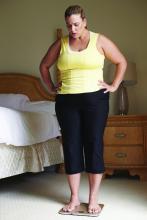Obesity is associated with elevated C-reactive protein levels among women with rheumatoid arthritis, but this elevation reflects higher fat mass rather than RA disease activity, according to a report published online April 10 in Arthritis Care & Research.
The study findings suggest that C-reactive protein (CRP) results should be interpreted with caution among obese women with RA, noted Michael D. George, MD, of the division of rheumatology at the University of Pennsylvania, Philadelphia, and his associates.
A similar link has already been noted between obesity and elevated levels of inflammatory biomarkers, including CRP, among people in the general population, indicating that adiposity can skew the test results of these biomarkers and suggest that inflammatory disease is more severe than it actually is. Yet “there is surprisingly little recognition of this issue among practicing clinicians,” Dr. George and his colleagues wrote.To examine possible associations between body mass index and inflammatory markers in RA, the investigators performed a secondary analysis of data from 451 adult RA patients in three cross-sectional cohorts and 1,652 RA patients in the longitudinal Veterans Affairs Rheumatoid Arthritis Registry cohort. The investigators compared these findings with those of about 21,000 control subjects from the general population who were assessed in the 2007-2010 and 1971-1974 National Health and Nutrition Examination Survey programs.
Among women with RA, obesity was associated with elevated CRP independently of other measures of disease activity, including swollen joint count, tender joint count, and global scores of inflammation. A “strikingly similar association” was seen in the control population. This indicates that the high CRP values in obese women with RA “are not reflective of greater RA activity but rather are an expected phenomenon related to adiposity,” Dr. George and his associates said (Arthritis Care Res. 2017 Apr 10. doi: 10.1002/acr.23229).
In contrast, obesity in men with RA did not correlate with elevated CRP levels. In fact, underweight men with RA tended to have significantly higher CRP than that of normal-weight and obese men. “It was beyond the scope of this study to fully evaluate the complex relationship between RA disease activity, disease severity, weight loss, frailty, comorbidities, advancing age, and other factors that might contribute to higher levels of systemic inflammation in low-BMI men,” the investigators noted.
The National Institutes of Health, the Rheumatology Research Foundation, the U.S. Department of Veterans Affairs, the National Institute of Arthritis and Musculoskeletal and Skin Diseases, and the National Institute of General Medical Sciences supported the work. Dr. George reported having no relevant disclosures; his associates reported ties to Pfizer, Novartis, and Amgen.


